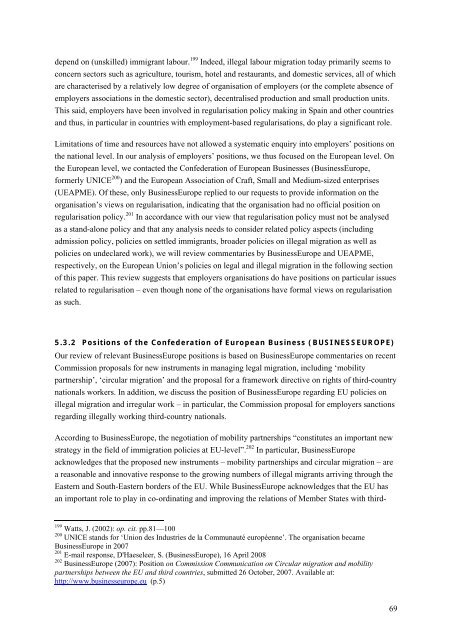REGINE Regularisations in Europe Final Report - European ...
REGINE Regularisations in Europe Final Report - European ...
REGINE Regularisations in Europe Final Report - European ...
Create successful ePaper yourself
Turn your PDF publications into a flip-book with our unique Google optimized e-Paper software.
depend on (unskilled) immigrant labour. 199 Indeed, illegal labour migration today primarily seems to<br />
concern sectors such as agriculture, tourism, hotel and restaurants, and domestic services, all of which<br />
are characterised by a relatively low degree of organisation of employers (or the complete absence of<br />
employers associations <strong>in</strong> the domestic sector), decentralised production and small production units.<br />
This said, employers have been <strong>in</strong>volved <strong>in</strong> regularisation policy mak<strong>in</strong>g <strong>in</strong> Spa<strong>in</strong> and other countries<br />
and thus, <strong>in</strong> particular <strong>in</strong> countries with employment-based regularisations, do play a significant role.<br />
Limitations of time and resources have not allowed a systematic enquiry <strong>in</strong>to employers’ positions on<br />
the national level. In our analysis of employers’ positions, we thus focused on the <strong>Europe</strong>an level. On<br />
the <strong>Europe</strong>an level, we contacted the Confederation of <strong>Europe</strong>an Bus<strong>in</strong>esses (Bus<strong>in</strong>ess<strong>Europe</strong>,<br />
formerly UNICE 200 ) and the <strong>Europe</strong>an Association of Craft, Small and Medium-sized enterprises<br />
(UEAPME). Of these, only Bus<strong>in</strong>ess<strong>Europe</strong> replied to our requests to provide <strong>in</strong>formation on the<br />
organisation’s views on regularisation, <strong>in</strong>dicat<strong>in</strong>g that the organisation had no official position on<br />
regularisation policy. 201 In accordance with our view that regularisation policy must not be analysed<br />
as a stand-alone policy and that any analysis needs to consider related policy aspects (<strong>in</strong>clud<strong>in</strong>g<br />
admission policy, policies on settled immigrants, broader policies on illegal migration as well as<br />
policies on undeclared work), we will review commentaries by Bus<strong>in</strong>ess<strong>Europe</strong> and UEAPME,<br />
respectively, on the <strong>Europe</strong>an Union’s policies on legal and illegal migration <strong>in</strong> the follow<strong>in</strong>g section<br />
of this paper. This review suggests that employers organisations do have positions on particular issues<br />
related to regularisation – even though none of the organisations have formal views on regularisation<br />
as such.<br />
5.3.2 Positions of the Confederation of <strong>Europe</strong>an Bus<strong>in</strong>ess (BUSINESSEUROPE)<br />
Our review of relevant Bus<strong>in</strong>ess<strong>Europe</strong> positions is based on Bus<strong>in</strong>ess<strong>Europe</strong> commentaries on recent<br />
Commission proposals for new <strong>in</strong>struments <strong>in</strong> manag<strong>in</strong>g legal migration, <strong>in</strong>clud<strong>in</strong>g ‘mobility<br />
partnership’, ‘circular migration’ and the proposal for a framework directive on rights of third-country<br />
nationals workers. In addition, we discuss the position of Bus<strong>in</strong>ess<strong>Europe</strong> regard<strong>in</strong>g EU policies on<br />
illegal migration and irregular work – <strong>in</strong> particular, the Commission proposal for employers sanctions<br />
regard<strong>in</strong>g illegally work<strong>in</strong>g third-country nationals.<br />
Accord<strong>in</strong>g to Bus<strong>in</strong>ess<strong>Europe</strong>, the negotiation of mobility partnerships “constitutes an important new<br />
strategy <strong>in</strong> the field of immigration policies at EU-level”. 202 In particular, Bus<strong>in</strong>ess<strong>Europe</strong><br />
acknowledges that the proposed new <strong>in</strong>struments – mobility partnerships and circular migration – are<br />
a reasonable and <strong>in</strong>novative response to the grow<strong>in</strong>g numbers of illegal migrants arriv<strong>in</strong>g through the<br />
Eastern and South-Eastern borders of the EU. While Bus<strong>in</strong>ess<strong>Europe</strong> acknowledges that the EU has<br />
an important role to play <strong>in</strong> co-ord<strong>in</strong>at<strong>in</strong>g and improv<strong>in</strong>g the relations of Member States with third-<br />
199 Watts, J. (2002): op. cit. pp.81—100<br />
200 UNICE stands for ‘Union des Industries de la Communauté européenne’. The organisation became<br />
Bus<strong>in</strong>ess<strong>Europe</strong> <strong>in</strong> 2007<br />
201 E-mail response, D'Haeseleer, S. (Bus<strong>in</strong>ess<strong>Europe</strong>), 16 April 2008<br />
202 Bus<strong>in</strong>ess<strong>Europe</strong> (2007): Position on Commission Communication on Circular migration and mobility<br />
partnerships between the EU and third countries, submitted 26 October, 2007. Available at:<br />
http://www.bus<strong>in</strong>esseurope.eu (p.5)<br />
69
















